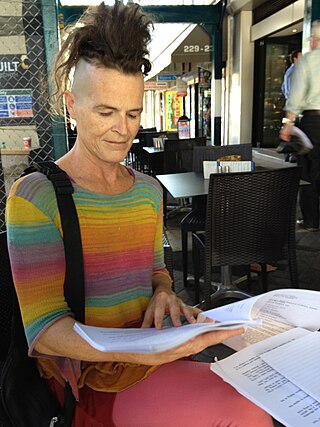Gender-neutral language is language that avoids assumptions about the social gender or biological sex of people referred to in speech or writing. In contrast to most other Indo-European languages, English does not retain grammatical gender and most of its nouns, adjectives and pronouns are therefore not gender-specific. In most other Indo-European languages, nouns are grammatically masculine or grammatically feminine, or sometimes grammatically neuter, regardless of the actual gender of the referent.
A third-person pronoun is a pronoun that refers to an entity other than the speaker or listener. Some languages with gender-specific pronouns have them as part of a grammatical gender system, a system of agreement where most or all nouns have a value for this grammatical category. A few languages with gender-specific pronouns, such as English, Afrikaans, Defaka, Khmu, Malayalam, Tamil, and Yazgulyam, lack grammatical gender; in such languages, gender usually adheres to "natural gender", which is often based on biological sex. Other languages, including most Austronesian languages, lack gender distinctions in personal pronouns entirely, as well as any system of grammatical gender.

The English personal pronouns are a subset of English pronouns taking various forms according to number, person, case and grammatical gender. Modern English has very little inflection of nouns or adjectives, to the point where some authors describe it as an analytic language, but the Modern English system of personal pronouns has preserved some of the inflectional complexity of Old English and Middle English.
Personal pronouns are pronouns that are associated primarily with a particular grammatical person – first person, second person, or third person. Personal pronouns may also take different forms depending on number, grammatical or natural gender, case, and formality. The term "personal" is used here purely to signify the grammatical sense; personal pronouns are not limited to people and can also refer to animals and objects.
Gender-neutral language or gender-inclusive language is language that avoids reference towards a particular sex or gender. In English, this includes use of nouns that are not gender-specific to refer to roles or professions, formation of phrases in a coequal manner, and discontinuing the collective use of male or female terms. For example, the words policeman and stewardess are gender-specific job titles; the corresponding gender-neutral terms are police officer and flight attendant. Other gender-specific terms, such as actor and actress, may be replaced by the originally male term; for example, actor used regardless of gender. Some terms, such as chairman, that contain the component -man but have traditionally been used to refer to persons regardless of sex are now seen by some as gender-specific. An example of forming phrases in a coequal manner would be using husband and wife instead of man and wife. Examples of discontinuing the collective use of terms in English when referring to those with unknown or indeterminate gender as singular they, and using humans, people, or humankind, instead of man or mankind.

Gender neutrality in languages with grammatical gender is the usage of wording that is balanced in its treatment of the genders in a non-grammatical sense. For example, advocates of gender-neutral language challenge the traditional use of masculine nouns and pronouns when referring to two or more genders or to a person of an unknown gender in most Indo-European and Afro-Asiatic languages. This stance is often inspired by feminist ideas about gender equality. Gender neutrality is also used colloquially when one wishes to be inclusive of people who identify as non-binary genders or as genderless.
A genderless language is a natural or constructed language that has no distinctions of grammatical gender—that is, no categories requiring morphological agreement between nouns and associated pronouns, adjectives, articles, or verbs.
A genderless language is a natural or constructed language that has no distinctions of grammatical gender—that is, no categories requiring morphological agreement for gender between nouns and associated pronouns, adjectives, articles, or verbs.
Impersonality may refer to:
In linguistics, allocutive agreement refers to a morphological feature in which the gender of an addressee is marked overtly in an utterance using fully grammaticalized markers even if the addressee is not referred to in the utterance. The term was first used by Louis Lucien Bonaparte in 1862.

Norrie, also known by the pseudonym Norrie May-Welby, is a Scottish-Australian transgender person who pursued the legal status of being neither a man nor a woman, between 2010 and 2014. The High Court of Australia ruled in April 2014 that it was in the power of the NSW Registry of Births, Deaths and Marriages to record in the register that the sex of Norrie was 'non-specific'.
The Japanese language has some words and some grammatical constructions associated with men or boys, while others are associated with women or girls. Such differences are sometimes called "gendered language". In Japanese, speech patterns associated with women are referred to as onna kotoba or joseigo, and those associated with men are referred to as danseigo.

Queer fashion is fashion among queer and nonbinary people that goes beyond common style conventions that usually associate certain colors and shapes with one of the two binary genders. Queer fashion aims to be perceived by consumers as a fashion style that focuses on experimenting garments based on people's different body shapes instead of following the restrictions given by gendered clothing categorization.
Rain Dove Dubilewski is an American model, actor, and activist, best known for their work in fashion as a gender-nonconforming model, posing alternately as male and female in photoshoots, productions, and runway shows. Dove was voted as SheWired's Most Eligible Bachelorette in 2014 and named one of Elle Magazine's 12 Women Who Are Redefining Beauty in 2015.
Pronouns are a class of words.
"Genderless" is a fashion subculture that emerged in Japan in the mid-2010s. Aiming to break societal gender norms in fashion, the genderless subculture is centered on gender non-conforming androgynous fashion. The subculture is mostly dominated by men, who are known as "genderless men".



